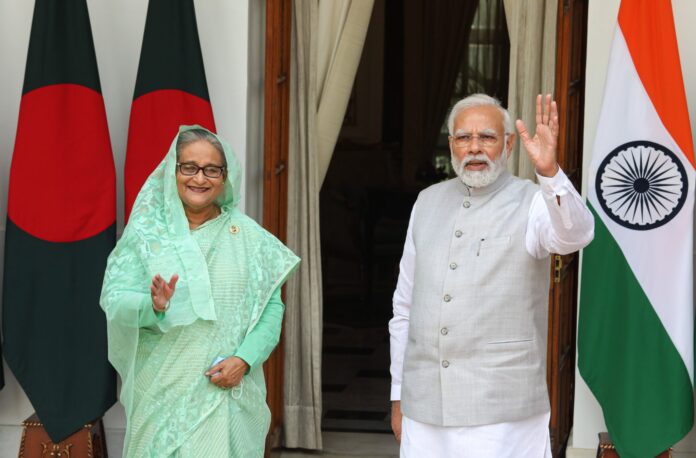As Sheikh Hasina, Bangladesh’s four-time Prime Minister, flees the country amid a wave of violent student protests, the consequences are rippling through South Asia, leaving India’s diplomatic standing once again under scrutiny. Hasina’s sudden departure marks yet another challenge for India’s regional strategy, highlighting a series of diplomatic blunders and shifting alliances that reflect a broader struggle to maintain influence in South Asia.
Sheikh Hasina has been a pivotal ally for India in a region often fraught with anti-Indian sentiment. Her tenure saw India-Bangladesh relations reach new heights, with Prime Minister Narendra Modi and Hasina meeting a record ten times in 2023 alone. However, her ousting reveals the fragility of such alliances and underscores a troubling pattern in India’s foreign policy. The abrupt and unexpected nature of her departure exposes the vulnerabilities in India’s regional diplomacy.
In recent years, India has faced a string of setbacks in its neighborhood. The fall of Afghanistan to the Taliban, the Maldives’ pivot towards China, and the military coup in Myanmar have all strained India’s regional influence. Sri Lanka and Nepal have also been wavering, juggling their ties between India and China. The loss of Hasina is indicative of a broader erosion of India’s traditional sphere of influence and influence in South Asia.
The departure of Hasina, who sought refuge in India before moving to the UK, signifies a significant shift in the geopolitical landscape. Her flight follows a pattern of increasing instability and political turbulence in countries once seen as reliable partners for India. This new reality forces India to reassess its strategic positioning and relationships in the region.
Former Indian Foreign Secretary Nirupama Menon Rao’s cautionary remarks resonate deeply. Rao emphasizes the necessity for India to navigate these changes with strategic foresight, avoiding hasty actions that could jeopardize long-term national interests. India’s historical support for Bangladesh during its liberation struggle contrasts sharply with its current predicament, suggesting a need for a more nuanced and forward-thinking approach to diplomacy.
Bangladesh’s strategic location, situated at the confluence of the Bay of Bengal and the Indian Ocean, adds layers of complexity to this geopolitical shift. The Bay of Bengal is a vital maritime corridor, and Bangladesh’s recent inauguration of its submarine base, equipped with Chinese submarines, signals a deepening of defense ties with China. This development highlights Bangladesh’s growing alignment with China, driven partly by dissatisfaction with Western policies and actions.
The United States’ focus on human rights and democracy in Bangladesh, while well-intentioned, has arguably pushed Dhaka closer to Beijing. Washington’s sanctions and visa restrictions have strained relations, inadvertently pushing Bangladesh towards a defense partnership with China that now dominates its arms imports. The U.S.’s stance on Bangladesh, while reflecting a commitment to democratic values, has unintentionally contributed to a shift in the regional balance of power.
The situation in Bangladesh is a microcosm of a broader trend affecting India’s foreign relations. As neighboring countries pivot towards China, India’s response has often been reactive rather than proactive. This reactive stance, combined with a lack of consistent diplomatic strategy, has led to a series of missed opportunities and diplomatic setbacks. India’s approach has been characterized by a series of ad hoc decisions rather than a cohesive, long-term strategy.
As India grapples with these challenges, the question remains: how can it reclaim its influence and navigate the shifting allegiances in South Asia? Strengthening existing alliances, pursuing more balanced and equitable diplomatic engagements, and avoiding the pitfalls of past strategies will be crucial. The current landscape demands a recalibration of India’s foreign policy approach to ensure it remains a significant player in the region despite the evolving dynamics.
In conclusion, the fall of Sheikh Hasina and the broader shifts in South Asia highlight the pressing need for India to adapt its diplomatic strategies. The challenges of the present must be met with a forward-looking approach that balances regional ambitions with pragmatic, principled diplomacy. Only then can India hope to restore and enhance its standing in a rapidly evolving geopolitical landscape.



